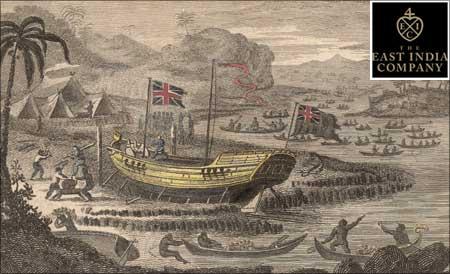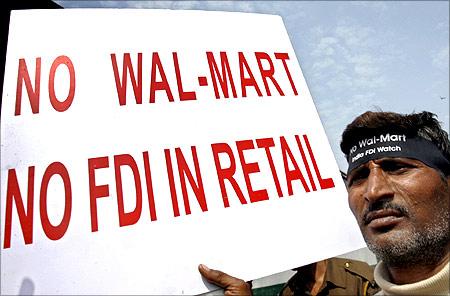Photographs: Hulton Archive/Getty Images A Faizur Rahman
The push for FDI in retail by foreign interests smacks of the East India Company syndrome and Indians have the right to protest any attempt by a class of corporate cronies to rule India by proxy, says A Faizur Rahman.
In a June 2006 Financial Times article, titled 'The onus is on India to show its gentle intent', Malvinder Mohan Singh of Ranbaxy counselled "India's business community" to be "sensitive to the growing concerns of other countries."
He wrote; "Five hundred years ago, a company was formed in London that directly led to British rule in India. There appears to be some concern that there is evidence of a reverse trend."
He was responding to Western accusations that Indian multinationals were indulging in predatory acquisitions outside India such as the takeover of Arcelor by Mittal Steel.
. . .
FDI in retail: How it could enslave, bankrupt Indians
Photographs: Reuters
The article was an attempt to allay these fears and ended with the assurance that "in more than 1,000 years, India has never conquered, but only assimilated and spread its culture and spirituality in a gentle way".
Singh need not have bothered with his condescending explanations. With the opening up of the retail sector for foreign direct investment it is the West that would be invading India again through despoiling corporations of the nature of the East India Company (EIC).
As pointed out by Singh, that the foundation for the British rule in India was laid by the EIC in 1757 after Robert Clive, with the help of the Company's private army and other dirty tricks, defeated Siraj-ud-Daula, the Nawab of Bengal in the Battle of Plassey.
. . .
FDI in retail: How it could enslave, bankrupt Indians
Photographs: Reuters
Clive took over Bengal's tax-system and it is said that his loot netted 2.5 million pounds for the EIC triggering a sharp increase in its share price back in London.
Not without reason did Nehru write in The Discovery of India that "it is significant that one of the Hindustani words which has become part of the English language is 'loot'."
Taking a cue from the then prime minister's oblique reference to loot, the present prime minister must realise that no foreign investor would be coming to India to improve its infrastructure or bring down inflation.
. . .
FDI in retail: How it could enslave, bankrupt Indians
Photographs: Reuters
When the FDI starts flowing, it would be for selfish financial gain and not for philanthropic purposes. It is common knowledge that 98 per cent of the retail industry, hailed as one of the sunrise sectors of the Indian economy, is unorganised and comprises small kirana shops, and handcart and pavement businesses.
And it is the refuge of about 4 crore (40 million) self-employed Indians who are here for being educationally unqualified (or under-qualified) to seek employment in other sectors.
With the organised retail sector set to garner 15-18 per cent of the market share after the entry of foreign players, tens of thousands of small traders may face bankruptcy as they will not be in a position to match huge multinational corporations in employing the two main profit maximisers: economies of scale and economies of scope.
. . .
FDI in retail: How it could enslave, bankrupt Indians
Photographs: Reuters
Even in urban areas, the increase in the number of mega malls and hypermarkets and the choice they offer at cut-throat prices would promote a consumerist culture among the people.
Savings will vanish and, as India does not have the western model of state sponsored social security, the middle class would soon find itself in dire straits.
It must be remembered that one of the main reasons for India to remain largely untouched by the financial crises in the West is the frugality and financial moderation of its people.
. . .
FDI in retail: How it could enslave, bankrupt Indians
Photographs: Reuters
And this will be the first casualty of FDI-generated consumerism.
As argued above, it is unabashed self-interest that forces western mega corporations to look for gullible markets in developing countries. This was ruthlessly brought out by John Perkins in his book Confessions of an Economic Hit Man.
Coining the term 'corporatocracy' for the nexus between corporations, banks and governments, Perkins writes that one of the most important functions of this triumvirate is to present the fashionable lives of its members, their mansions, yachts and private jets "to convince us that purchasing things is our civil duty, that pillaging the earth is good for the economy."
. . .
FDI in retail: How it could enslave, bankrupt Indians
Photographs: Reuters
Highlighting the nexus Perkins cites the example of Robert McNamara and the various roles played by him from being the President of Ford, to Kennedy's and Johnson's secretary of defense, and finally becoming the President of World Bank which he jockeyed "into becoming an agent of global empire on a scale never before witnessed."
Perkins also gives the example of George Shultz, Casper Weinberger, Richard Cheney and President George H W Bush and claims that all these people held prominent positions in both, the government and private corporations such as Bechtel, Halliburton and Zapata Petroleum Corp.
Expressing his shock at "such an apparent breach in the separation of powers", Perkins says that it is all about controlling the world and bringing every person in it under the influence of corporatocracy.
. . .
FDI in retail: How it could enslave, bankrupt Indians
Photographs: Reuters
"The modern empire" he claims, is in the process of "executing history's most brutal, selfish and ultimately self-destructive resource grab."
Should the unwarranted intervention of the US Ambassador and Charge d'Affaires ad interim, Peter Burleigh, in support of FDI be seen and understood in this context?
Nevertheless, Confessions of an Economic Hit Man eerily reminds us of the takeover of India by the British through the EIC of which Warren Hastings, the first Governor-General of India, was the most senior executive.
. . .
FDI in retail: How it could enslave, bankrupt Indians
Photographs: Reuters
If John Perkins is to be believed we Indians have to view FDI not just as something that would affect employment but as one of the instruments of corporatocracy through which it seeks to enslave us.
The push for FDI by foreign vested interests smacks of the East India Company syndrome and the people of this country have every right to protest any attempt by a class of corporate cronies to rule India by proxy.
A Faizur Rahman is the secretary general of Forum for the Promotion of Moderate Thought among Muslims. He may be reached at faizz@rocketmail.com.










article